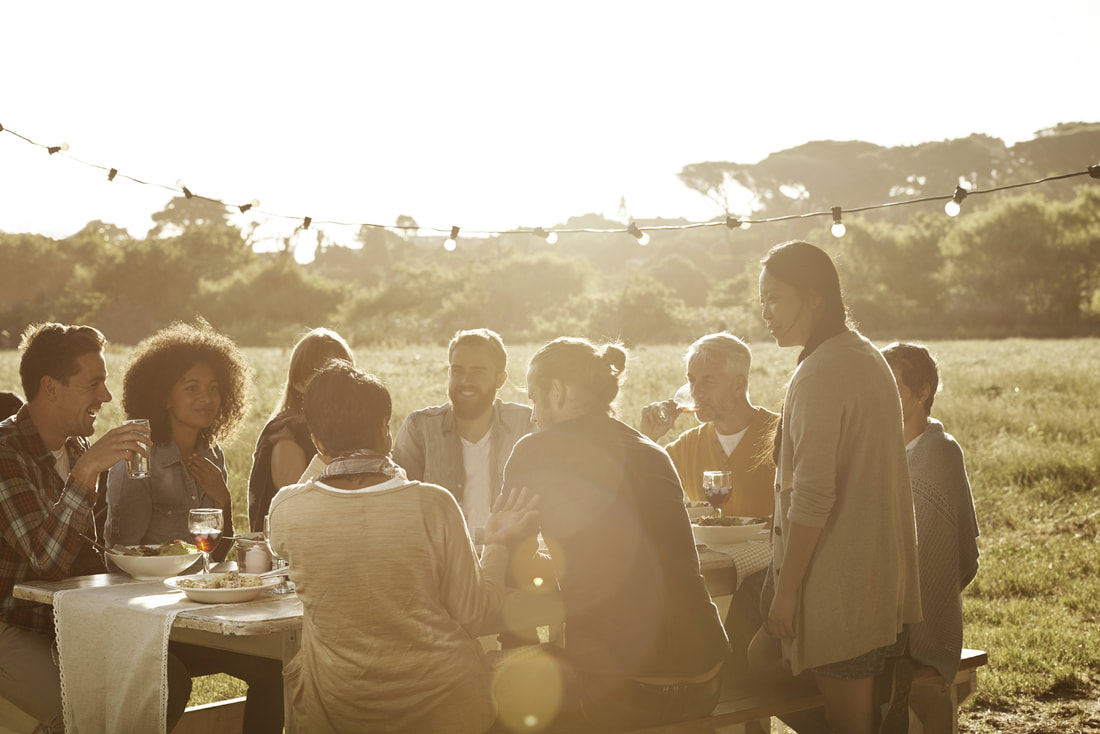|
Many years ago I spent a month working in Seoul, South Korea. The company who I was working for owned one of the best hotels in the world. And I got to stay there all by myself. No wife. No kids. No one but me. I'll admit, this was fun and relaxing for the first day or two. But after that, it kinda sucked coming home to no one and waking up alone. Most surprisingly, the part that sucked the most was having my breakfasts and dinners alone in the grand hotel restaurant. Have you ever sat for a meal in a restaurant alone? It's not fun. There’s something about it that doesn’t feel natural. Beyond the basic loneliness of it, there’s an overwhelming sense of "not belonging." It’s as if you’ve been exiled, or abandoned, or marginalized for some reason.
Namsam Park, Seoul South Korea That big, beautiful room, with an amazing view of the Namsan Park and all the fall foliage on grand display, slowly began to feel like a prison cell or tomb. We are not meant to be alone. We are community creatures. In fact our human survival depends on others. Numerous tests and studies have been published on prisoners who are kept in solidarity confinement. It is now being argued that such treatment of humans is a cruel and unusual punishment; one that doesn’t often fits the crime. As we continue to walk the path that divides people into small groups, what will we eventually be reduced to? Isolationism, going it alone, is no different than living in captivity. By that I suggest that it‘s like being trapped in you own ideas, thoughts, and limited knowledge. When you only hear your own voice you forget how to hear the still small voice within you. And when you only learn from yourself, or do not expand or evolve your worldview, what might you become? We need others to help balance out what we lack. We need others to acknowledge our own existence and being and dare I say our worth. So we build bridges and cross road and invite people to the table to share our time, story, and wisdom. Even as Jesus left his group to be alone in prayer and mediation, we never see him eat alone. He understands the importance of gathering at the table, as a community, to celebrate life in the meal. Richard Rohr teaches, “Our spirituality is inseparable from the way we live in the world.” If we isolate ourselves from others then our spiritually flatlines. He goes on to speak of the Eucharist, communion, as a place where our human self and spiritual self come together with others. He writes, “the realm of embodiment through the Christian sacrament of Eucharist is more than a theological statement... It is an invitation to socially experience the shared presence of God, and to be present in an embodied way.” Rohr holds a pretty standard Christian or Trinitarian worldview, everything comes down to relationship. I believe he might say the same about the biological world as well. “Jesus is always going in and out of houses. What happened around the tables in those houses shaped and named the social order.” We are not meant to eat alone anymore than we are to be pushed away, marginalized or excommunicated. When we sit at the table, sharing what we have (including our time and story) we begin to redefine the way we see friendship in general. When Jesus is asked, “Who is my neighbor?” He responds with this story to help us see the other through four separate lenses: a beaten man, a priest, a Levite, and a stranger (their enemy) who is willing to risk all that he has to help a person left for dead. Jesus teaches us how one person can make a difference in another person’s life. But only if are we willing to take the risk to be that good neighbor? I’d like you to think about someone who has influenced on your life. Perhaps someone who was there to help you make an important life changing decision. Next, imagine where you might be had you never met that person. What might your life look like? How might that effect who you are today? I don’t know if I’d be here, writing this blog or raising this family, had I not met Jesus. For it was my faith in him that allowed me to trust enough (and to fear less) to keep living s despite the many ways I was killing myself. Jesus invited me to the table. He did not push me away or judge me by my past. He welcomed me with an open heart; sharing his time and story with me. Rohr adds, “Jesus’ most consistent social action was eating in new ways and with new people, encountering those who were oppressed or excluded from the system...In the process he redefines power and the kingdom of God...and shows us that spiritual power is primarily exercised outside the structures [we create].” We are not meant to be isolated or alone. Yet today, somebody is. How might you change that from happening again tomorrow? An Invitation to the Table
(Iona Abby Worship Book) The table of bread and wine is now to be made ready. It is the table of company of Jesus, and all who love him. It is the table of sharing with the poor of the world, with whom Jesus identified himself. It is the table of communion with the earth, in which Christ became incarnate. So come to this table, you who have much faith and you who would like to have more; you who have been here often and you who have not been for a long time; you who have tried to follow Jesus, and you who have failed; come. It is Christ who invites us to meet him here.
0 Comments
Leave a Reply. |
Ian MacdonaldAn ex-copywriter turned punk rock pastor and peacemaker who dedicates his life to making the world a better place for all humanity. "that they all might be one" ~John 17:21“Prius vita quam doctrina.”
~ St. Thomas Aquinas (1225–1274) * “Life is more important than doctrine.”
Archives
June 2024
|

